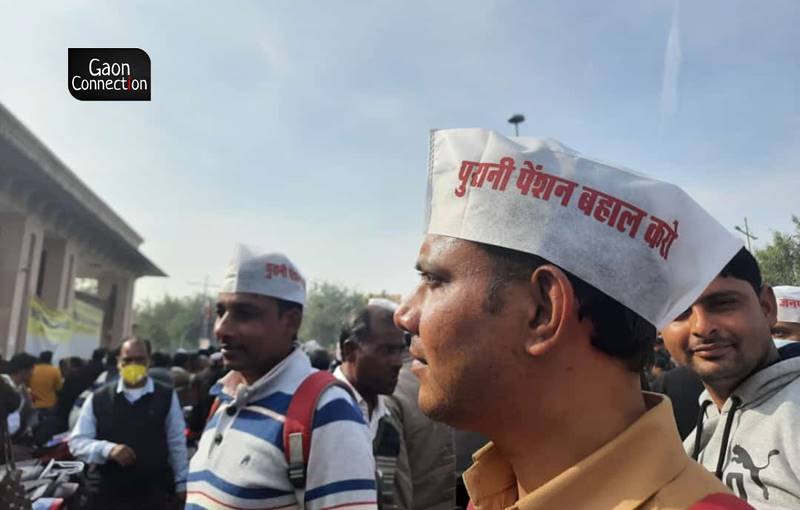Lucknow, Uttar Pradesh
Tens of thousands of government employees, including government school teachers, sanitation workers and anganwadi workers, from across Uttar Pradesh gathered today at Eco Garden in the state capital Lucknow to protest against the new pension scheme.
Their demand — withdrawal of the New Pension Scheme of the central government and restoration of the old pension scheme.
“If an employee with the old pension scheme retires today, they will get up to fifty thousand rupees as a monthly pension while those on the new pension scheme are retiring on mere seven to eight hundred rupees a month,” Dinesh Chandra Sharma, president of Uttar Pradesh Prathmik Shikshak Sangh, a state-level teachers’ association, told Gaon Connection. More than a million government employees in Uttar Pradesh have been debarred from availing the old pension scheme, he informed.
“In the new scheme, ten per cent of the gross salary of an employee is being deducted. This money is being used to give to the corporate. Who will give the guarantee that at the time of retirement these employees will get fixed pension? asked Sharma highlighting issues with the new pension scheme. “The state government is not making any promises on this. We demand restoration of the old pension scheme,” he added.
What is the new pension scheme?
The National Pension System (NPS) is being administered and regulated by Pension Fund Regulatory and Development Authority (PFRDA) set up under PFRDA Act, 2013.
NPS is a market linked, defined contribution product. This new scheme is mandatorily applicable on central Government employees (except Armed Forces) recruited on or after January 1, 2004. All state governments excluding West Bengal have adopted NPS for their employees.
According to the Department of Financial Services, government employees make a monthly contribution at the rate of 10 per cent of their salary and a matching contribution is paid by the government. For central government employees, the employer’s contribution rate has been enhanced to 14 per cent with effect from April 1, 2019.
To protest against the new scheme, with placards displaying “NPS hai tension: haq hamara purani pension” (NPS is tension: Old pension is our right), thousands of employees — men and women — from Kannauj, Mirzapur, Ghaziabad, Lakhimpur Kheri, and several other districts from across the state reached the state capital.
“This is a historic rally. Lakhs of employees have come from the state. The government will get a lesson if it ignores UP’s employees,” warned Sharma, who organised the massive rally in Lucknow today, November 30.
“These employees have been suffering for the past five years, they have decided that employees will not take tension now instead they will give. The state govt should speak to us if they want to resolve these tensions,” he added.
“We help the government in every aspect, even in poll duties. When we retire from our duties then we should get at least some benefits so that we survive after our retirement. We do not want the new pension,” 42-year-old Aparna Singh, a government teacher posted in Biswan block of Sitapur district, told Gaon Connection.
Singh earns Rs 50,000 a month for her work. With the new pension scheme into effect, she is expected to get something around Rs 700 monthly pension after her retirement, she said.
The rally was also joined by sanitation workers, cooks in government schools, and anganwadi workers. They demand timely wages and a hike in honorariums. In the state government, an anganwadi worker earns up to Rs 5,500 and cooks up to Rs 1,800 a month.














